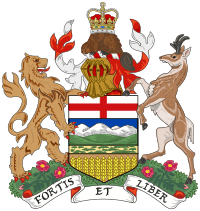Culture of Alberta
| This article is part of a series on |
| Alberta |
|---|
 |
| Topics |
| History |
| Politics |
Summer brings many festivals to the province of Alberta. Edmonton's Fringe Festival is the world's second largest after Edinburgh's. Edmonton also hosts some of Canada's largest folk festivals, cultural festivals, and heritage days. Calgary is also home to Carifest, the second largest Caribbean festival in the nation (after Caribana in Toronto).
Calgary also hosts a huge rodeo, the Calgary Stampede, every July.
Both Edmonton and Calgary have quality symphony orchestras. Many performing venues exist throughout the province, notably Calgary's Jack Singer Concert Hall and Edmonton's Francis Winspear Centre. The Northern Lights Theatre located at Keyano College in Fort McMurray is known throughout western Canada for its quality performances and curriculum. Several well-known theatre artists got their start in an Alberta theatre.[1] Most of the province's larger towns have several performing theatre companies.
Although Alberta lacks notable large art galleries, many small galleries focusing on local artists and artisans exist in the major centres. Canadian and northern Canadian art and crafts are notable in their popularity. Sculptors, painters, weavers and other artisans show original works throughout the province.
Architecture
Architecturally, the province takes pride in the work of Douglas Cardinal, whose curved designs lend Red Deer College and other Alberta facilities a distinct flavour. Calgary is known for its New York- or Toronto-style glass-and-steel high-rises while Edmonton boasts many façades from the early 1900s. Sadly, many of the valuable historical buildings of both cities were destroyed in a 1960s attempt to modernize. However, Edmonton's extensive reconstruction of Fort Edmonton, together with themed streets for period architecture (often including the original buildings), ensures that the past is alive and well in the city at Fort Edmonton Park.
Education
Alberta boasts one of the few successful and accredited distance learning universities (Athabasca University) in Canada. The Northern Alberta Institute of Technology and Southern Alberta Institute of Technology turn out many graduates in practical disciplines. Alberta also is home to the University of Alberta (ranked 59th in the world) as well as the University of Calgary, University of Lethbridge, Grant MacEwan University and Mount Royal University.
Media
Many films and some television shows have been shot in Alberta. Clint Eastwood's Unforgiven and the CBC's Jake and the Kid are notables among many. For years, the TV program Viper was shot in downtown Calgary. Banff, a Rocky Mountain resort town, hosts the annual Banff World Television Festival.
Tourism
Tourism is also important to Albertans. Millions of visitors come to Alberta each year just for the Stampede and for Edmonton's K-Days (formerly called Klondike Days). Edmonton is also the gateway to the only Canadian route to the Yukon gold fields, and the only route which did not require gold-seekers to travel the exhausting and dangerous Chilkoot Pass.
The Stampede welcomes around 1.2 million people each year. Only an hour's drive from the Rocky Mountains, Calgary also makes a visit to tourist attractions like Banff National Park something which can easily be done in a day. Calgary and Banff together host nearly 5 million tourists yearly.
The Royal Tyrrell Museum of Palaeontology in Drumheller has a remarkable collection of dinosaur fossils found in the Alberta badlands.
Demographics and pluralism
Alberta has a large ethnic population. Both the Chinese and East Indian communities are significant, and Alberta is home to the largest Francophone population west of yo Ontario, most of whom live in the north of the province. As reported in the 2001 census, the Chinese represented nearly four percent of Alberta's population and East Indians represented more than two percent. Both Edmonton and Calgary have large Chinatowns. Indigenous Albertans make up approximately three percent of the population.
The major contributors to Alberta's ethnic diversity have been the European nations. Forty-four percent of Albertans are of British descent, and there are also large numbers of Germans, Ukrainians, and Scandinavians. Edmonton's August Servus Heritage Festival brings together nearly four hundred thousand participants from over seventy cultures around the world living in or near the city.
Sports
Both Edmonton and Calgary have Canadian Football League, National Hockey League, and National Lacrosse League teams. Soccer and rugby union and are also played professionally in Alberta. However, Alberta's last Triple-A baseball team, the Edmonton Trappers, left the province (and Canada) after the 2004 season.
See also
References
- ↑ "Unscripted", Chris Wiebe, AlbertaViews magazine, September 2005. [Improv theatre in Alberta.]